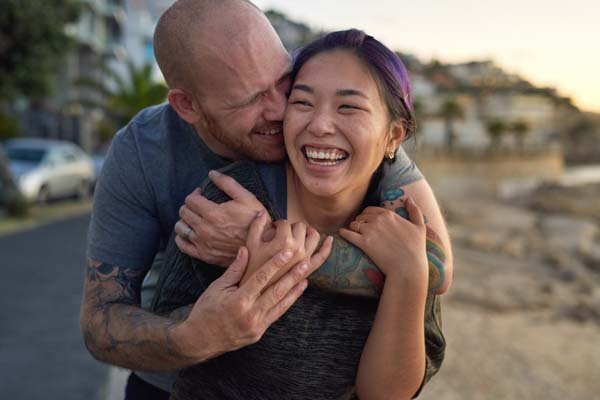Oftentimes, the concept of intimacy is closely intertwined with sex. Now, when I say “sex,” I mean anything that a particular defines as sexual. Sex can be strictly defined as intercourse, but for the purposes of this post, “sex” is any sexual activity.
That said, there is still a difference between “sex” and “intimacy.” Sex is one form of intimacy. However, there are infinite forms of intimacy to be explored. All of them have the potential to be exciting, bonding, and hot. So, why limit yourself to society’s expectations?
Why Should Couples Explore Non-Sexual Ways to Be Intimate?
What drives people together in new couples is novelty. “I’ve never met anyone who. . . “ is a refrain you may have said yourself. The sparkliness of the new relationship can even get you to say silly things like,“Oh my gosh, she likes water too!”
In long-term relationships, novelty is out the window. Which is why sexual frequency drops after the first year. The most obvious and common reason is that the “honeymoon phase” has ended. The relentless lust has eased and you’ve settled into a relationship rhythm. This is the point where couples can start to engage other types of intimacy to drive closeness in the relationship.
Other reasons to explore non-sexual forms of intimacy include:
You’re still dating and religious or cultural norms restrict you from having sex until marriage
One of you is struggling with a physical injury, illness, or disability
One of you is struggling with mental health issues
At least one of you has reached an age where your sex drive is diminished
There are other reasons, of course, but the good news is that you can connect in so many other ways!
A Few Non-Sexual Ways to Be Intimate With Your Partner
The Basics
Take any and every opportunity to experience the sensation of affectionate physical touch. This means, in particular, cuddling and holding hands. Don’t take these moments for granted and, whenever possible, have a sweet make-out session. Remind yourselves how hot it was when you first met.
Teamwork
There are countless activities you can do as a couple. A few examples:
Massage: Take turns helping each other and enjoy the release of some feel-good hormones and chemicals. It happens when two loving people lay hands on each other.
Dancing: Bumping, grinding, eye contact, and more.
Exercise: Do your workout together and savor the sweat.
Preparing and enjoying meals: Choose a recipe together, shop together, cook together, eat together, clean up together, and more.
Spiritual
It doesn’t have to be about religion. It doesn’t even have to be you two sharing the same religion. What matters is that you create a way in which you can connect spiritually on a regular basis.
Intellectual/Emotional
The brain is your number one sex organ. It’s where the connection forms, grows, adapts, and evolves. Here are just some of the many entry points into intellectual and/or emotional intimacy:
Vulnerability: Vulnerability is the spring from which you will be able to form deeper connection. Without it, you’re just checking boxes. What’s vulnerable in your relationship? Where do you feel fear, loneliness, or sadness? Consider sharing these things.
Verbal affection and gratitude: Don’t leave these feeling left unsaid. Make a habit of expressing how much mean to each other.
Love notes (or texts): That verbal affection can be especially intimate when it arrives in the form of the occasional unexpected but very welcome love note.
Listening and supporting: This is a love language in and of itself. Sex can be awesome, but nothing makes a partner feel safer and more secure than being genuinely heard and validated.
Setting goals together: Never rest on your laurels. Keep doing the work to grow as a couple.
When There’s an Intimacy Disconnect
Relationships are complex. You will likely experience times when you feel distant and detached. That’s precisely when couples therapy becomes so valuable. Working with an experienced and unbiased guide is an ideal way to explore intimacy in all its guises.
If you want to learn more about how I think of couples counseling, stop by my marriage and couples counseling page. If you are in Minnesota and want to learn skills to reach these types of goals, let’s talk soon. I’m in Edina and serve the greater Minneapolis area. You can reach me by phone: 612-230-7171 or email through my contact page. Or you can click on the button below and self-schedule a time to talk by phone or video.



